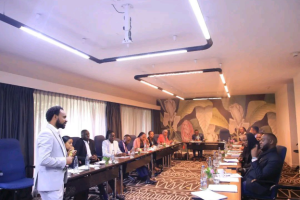
On Thursday, 20th March 2025, Prime Minister Abiy Ahmed (PhD) presented his government’s six-month performance report during which he had the opportunity to explain all of the report’s content and give answers and explanations to the queries of the representatives. On the occasion, several questions were posed to the premier on a host of issues focusing mainly on the situation of the economy, inflation, the quest for peace with the forces that have gone to the bush with the intent of attacking the government security forces and inflicting a lot of instability in certain parts of the country. The MPs also asked how the government is resolving the current crisis in the Tigray region where the interim administration is in an open showdown with the TPLF leadership creating a lot of anxiety among the population. The issue of Ethiopia’s quest for access to a seaport has also been a reason for a request of the parliamentarians who needed an explanation given the flurry of diplomatic efforts between forces that are involved in the issue.
The premier took all the time necessary to address all of the issues including the allegations of certain parliamentarians which alleged failures of the government to address the issue of peace and security of the country and the shortcomings of the economic progress of the country.
He started first by explaining how his government began addressing the economic challenges that the country faced and how there have been significant improvements after the full implementation of the Home Grown Economic Reform. Abiy asserted that Ethiopia is on the path to registering its highest economic growth by the end of the current fiscal year, citing the positive results recorded in the past 8 months.
The Prime Minister noted that the country has set a goal to register an 8.4% growth during the 2024/2025 fiscal year and diligent efforts are being made across various sectors to achieve this plan in Ethiopia. He added, “Major economic indicators have shown significant progress over the past eight months. If this momentum is sustained in the remaining months of the fiscal year, Ethiopia is projected to achieve economic growth exceeding 8.4 percent for the current fiscal year.”
The premier said that he had formed a special committee to identify key challenges, including foreign exchange shortages and power supply and efforts are underway to resolve them. He added that this year alone, power supply to the industrial sector has increased by 50 percent compared to the previous year. Cement production, which faced shortages in the past, is now sufficient to meet domestic demand and is also being exported.
Additionally, industrial production capacity has reached 61 percent, and 55 new factories have begun operations this year, the Prime Minister noted. Highlighting the agriculture sector’s achievement and ongoing efforts, Premier Abiy said smallholder farmers have cultivated 20.5 million hectares of land.
In wheat production, 4.2 million hectares were planted in the rainy season, while 3.7 million hectares were cultivated through irrigation, with an expected yield of no less than 300 million quintals, Abiy stated, noting that cluster farming is playing a significant role in the sector.
According to Abiy, significant progress has also been recorded in coffee and tea production. Notably, in the past eight months alone, coffee exports have generated US$1.2 billion in revenue.
Regarding revenue, Abiy said in the past eight months, more than 580 billion birr has been collected in government revenue. However, this accounts for only 7 percent of the gross domestic product, highlighting the need for improvement. Increasing revenue is essential to meeting the development demands throughout the country effectively. The government cannot satisfy all the demands of nationals unless everyone pays the taxes that are due. The percentage of taxation in Ethiopia is very low compared even to our neighboring countries.
Meanwhile, at the same time, Prime Minister Abiy said his government is taking careful measures to shield low-income citizens from the impact of price inflation through substantial subsidies.
Talking about security and peace issues the premier said the government of Ethiopia is striving for sustainable peace and is open for peace talks. The premier said that conflict is an inevitable phenomenon; however, the culture of resolving conflicts through peaceful means in the country has to be developed.
He pointed out that the government is open to criticism and peace talks with any parties in all parts of the country, urging them to be ready for peaceful discussion with the government. He stressed that Ethiopia understood very well the benefits of peace and would always prefer to avoid any form of hostilities both at home and abroad. What is more, he said over the past seven years Ethiopia has not shot even one bullet against its neighboring brotherly countries not because there was no reason to engage in similar action but because Ethiopia appreciates peace and would always prefer to give priority to peaceful initiatives rather than engage in hostilities or violence.
The prime minister however warned that any attempt to topple the elected government of Ethiopia through armed struggle is utterly impossible and unacceptable, The government of Ethiopia incorporated competing parties to foster peaceful discussion and enhance inclusive dialogue in the country; this is viewed from the government’s firm conviction for sustainable peace, he pointed out.
In this respect, the Pretoria Peace Agreement was an unprecedented decision that demonstrated the commitment of the Ethiopian government to peace, emphasizing the significance of the Pretoria Agreement in providing lessons for peace talks rather than taking arms, Prime Minister Abiy said.
Despite remarkable achievements, some issues of the Pretoria Agreement have not been implemented duly, one of which is the issue of disarmament, demobilization, and reintegration under the so-called DDR project, the premier noted.
The Prime Minister also urged for the effective implementation of DDR, underlining that the delay of its implementation could mainly hurt the people of Tigray.
Furthermore, the Prime Minister lauded the Interim Administration of Tigray as it has tried its best to prevent additional conflict over the past two years. He said following the end of the mandate of the interim administration discussions are underway on reforms that are necessary so that it will remain operational for an additional year, focusing on empowering the people of Tigray in preparation for the upcoming national election, where they will hold supreme political authority.
Addressing the issue of Ethiopia’s quest for access to the sea without recourse to force, he stressed that Ethiopia’s pursuit of peaceful access to the sea is gaining significant international recognition contrary to what once this issue was viewed by some circles among the international community. Talking about Ethiopia seeking access to the Red Sea is now no more a taboo. He reiterated Ethiopia’s desire to engage in dialogue and discussion regarding access to a sea port.
He pointed out that Ethiopia’s request for maritime access is justified by the international community, noting that Ethiopia is the largest landlocked nation in the world. Abiy reiterated the potential for constructive dialogue regarding the Red Sea and the Abay River, advocating for the principle of give and take approach to these shared resources. He emphasized that access to the Sea is an existential matter for Ethiopia, but underlined that the country aims to peacefully resolve the issue with the principle of give and take.
Hence, Ethiopia’s desire for access to the Red Sea will not drag the country into confrontation with the brotherly countries of Somalia, Djibouti, Eritrea, and Kenya. Instead, there is significant potential for collaboration and mutual benefit if we can achieve a shared understanding, the premier elaborated. If the Red Sea issue is not resolved through dialogue, he warned, it will become a burden for future generations. A fast-growing Ethiopia with 130 million people cannot be confined to only one port. However, he reiterated that Ethiopia’s approach is to find a peaceful resolution through only peaceful negotiations and dialogue.
Speaking on the Grand Ethiopian Renaissance Dam, GERD’s current status, Prime Minister Abiy said that the dam is something that all Africans should be proud of. This flagship project is where Ethiopians have shown their capability, that they can also correct their past mistakes and move on to complete projects even if they are monumental such as the GERD. He indicated that this significant development project will soon be inaugurated, emphasizing that the dam will also provide substantial advantages to neighboring countries downstream. A similar huge project will be the new state-of-the-art airport to be constructed around Bishoftu, near Addis Ababa.
Prime Minister Abiy assured that the water levels at the Aswan Dam remain unaffected despite the GERD’s filling contrary to what many forces in downstream countries have been sustaining and showing unnecessary anxiety. Ethiopia has repeatedly stated that it has no intention of harming them, the premier noted.
Talking about the National Dialogue that is all-inclusive and still underway, he said it would nurture lasting peace in the country and realize national consensus through a shared narrative. He said that such discussions in Ethiopia are long overdue and there were no attempts to carry out such discussions before. However, the current reformist government has initiated this crucial occurrence to listen to what Ethiopians want and what the government should do. He regretted that those forces that dismiss this initiative as motivated only to strengthen the government and weaken the opposition is baseless because this is a legitimately and democratically elected government that has no anxieties as some forces may wish to believe.
The objective of this huge project is to listen to the heartbeat of Ethiopians and resolve all outstanding issues that have been rolling down across generations once and for all. He said this is an occasion to come to terms with the past and create the ideal conditions to move on as have several other countries before us.
What would be useful for all of us, according to the premier, is to support this initiative by taking part in it and not dismiss it as useless or a waste of time and resources as certain forces would like to depict it and urge their followers to snub it. The premier said that the path to peace is always negotiations and peaceful discussions to which his government is always ready.
BY FITSUM GETACHEW
THE ETHIOPIAN HERALD SATURDAY 22 MARCH 2025




